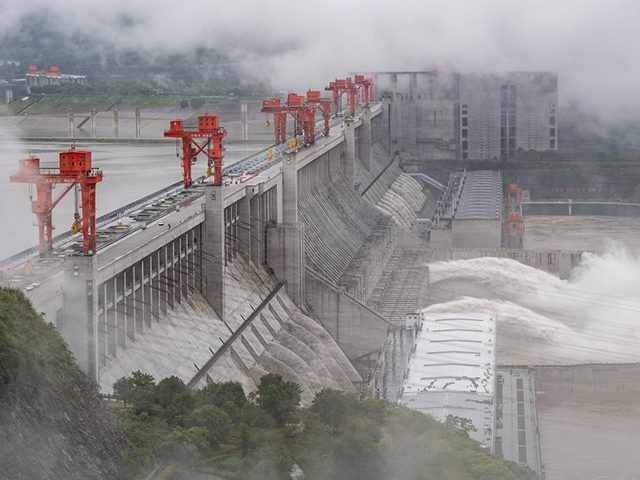Australia’s Spectator revealed on Thursday that police received nearly 100 corruption complaints during the construction of the world’s largest hydroelectric dam, the Three Gorges Dam, currently straining under the pressure of once-in-a-century floods.
The Chinese Communist Party (CCP) is not eager to discuss how many corners might have been cut to make up for the funds that were pilfered from the $30 billion project.
Chinese officials insist the Three Gorges Dam is perfectly safe, recently-admitted structural shifts were well within its safety parameters, and concerns to the controversy are irresponsible fearmongering driven by hostile foreigners hoping to destroy public faith in the Chinese government.
The Spectator grimly noted CCP officials talked the same way about several other dams right before they collapsed. Given that “criticism of the Three Gorges project is forbidden” and the Party cracked down hard on doctors who tried to draw attention to the Wuhan coronavirus in the early days of the pandemic, that concession in early July that the walls “leaked, moved, and distorted” looks more alarming.
“It is plausible because during construction there were nearly a hundred reported instances of corruption, bribery and embezzlement, including 16 cases directly related to construction,” the Spectator recalled.
“The dam’s principal sponsor, former Premier Li Peng, used his position to appoint relatives to senior positions in the construction company. On completion and, with several hundred thousand forcibly relocated inhabitants denied their full resettlement entitlements, Li’s family ended up controlling 15 per cent of China’s power generation industry,” the report added.
“The Three Gorges project is a fitting metaphor for today’s China. Full of promise and fanfare at the time, it has failed to deliver the key objective of flood mitigation,” the Spectator concluded.
China’s state news service Xinhua, in the course of applauding the civic spirit and determination on Thursday of a Communist Party member named Mei Junzhou in the eastern Jiangxi province, inadvertently admitted the flood control situation is more precarious than previous Party statements implied:
“Around dinner time on July 11, the water level at the Yangtze exceeded the guaranteed mark of 22.4 meters, posing a grave danger to the nearby village,” Mei said. “The floodwater was rising, and I found a leak on the rear surface of the embankment. I sent for experts immediately.”
After about an hour of effort, the experts managed to block the leakage.
“If I discovered the leakage one hour late, the embankment would be in danger,” Mei added.
The No. 85 station is the most dangerous post in Jiangxinzhou because the floodwater is diverted in that location. The levee there faces the most violent waves. Since July, Mei Junzhou seldom sleeps before 2 a.m.
The UK Daily Mail saw frayed nerves on Chinese social media getting strained further last week by a viral video from unknown creators that modeled what could happen if the Three Gorges Dam collapsed completely:
Asia Times on Thursday quoted an unnamed professor at Peking University who thought the “rare” admission by Chinese state media that the Three Gorges Dam “deformed a little bit when holding stormwater to protect downstream cities like Wuhan” could be a sign of attitudes shifting among top Communist Party officials about mega-projects, especially hydroelectric power plants, which appear to have vanished from China’s plans for the future.
“The timing is interesting. Can this be a sign that Beijing is changing its attitude towards the dam and other mega-hydroelectricity projects? Construction of the dam started in the 1990s during the presidency of Jiang Zemin. His deputy, Premier Li Peng, was the leading proponent. The current top leadership may have become less enamored with projects like this, especially since Li died last year and when the clout of Jiang, now at a senior age, is also waning,” the professor speculated.
In addition to Jiang Zemin going out of style, Asia Times noted that Chinese engineers and scientists are increasingly bold in questioning the value of the Three Gorges Dam as a defense against floods.
One Chinese engineer estimated the dam has only been able to hold back about nine percent of this year’s floods, which are actually not as severe as the worst-case assumptions made when Three Gorges was designed. Others suggested the dam actually caught a major break when the weather improved slightly over the past few weeks and might have failed catastrophically if June’s rain pattern had continued unabated.

COMMENTS
Please let us know if you're having issues with commenting.